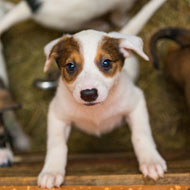‘Shocking’ number of online pet adverts across EU

Nearly all of the charities surveyed (95 per cent) said there was a problem with online pet sales in their country.
Over half a million cats and dogs are available to buy online every day across Europe, a new report has found, prompting animal welfare groups to call for change.
The Blue Cross and the EU Dog and Cat Alliance put together a snapshot of online adverts for dogs and cats in 21 European countries. On any given day, 400,579 dogs and 104,318 cats were advertised for sale. Thousands of exotic animals were also available to buy.
Many of these pets had health problems, were underweight or underage. A lack of animal welfare information was also a common theme among the adverts. Some websites even encouraged users to buy animals impulsively, with financial loan options highlighted for those who couldn’t afford to buy a pet straight away.
Nearly all of the charities surveyed (95 per cent) said there was a problem with online pet sales in their country.
The Blue Cross said its findings highlight a need for action across Europe to tackle these online adverts, through self-regulatory groups such as the Pet Advertising Advisory Group (PAAG), which has already proved successful in the UK and Ireland.
Becky Thwaites, the charity’s head of public affairs, commented: “The findings from our report on the online sale of pets in Europe has shocked us all. The cases of unscrupulous breeders and sellers who prioritise profit over welfare is clearly a growing problem that needs to be tackled.
“We have seen the success that PAAG in the UK has had in removing inappropriate ads, improving the standard of advertising and most importantly, improving the welfare of the animals, and we are confident that the same can be achieved across Europe with additional groups being set up in more European countries.”
The Blue Cross and the EU Dog and Cat Alliance, launched their report in European Parliament last week (27 September). As a result, Marco Valetta, member of the cabinet for the European Commissioner for Health and Food Safety, pledged to support the new European Pet Advertising Advisory Group.



 The Animal and Plant Health Agency (APHA) has updated its online reporting service for dead wild birds.
The Animal and Plant Health Agency (APHA) has updated its online reporting service for dead wild birds.